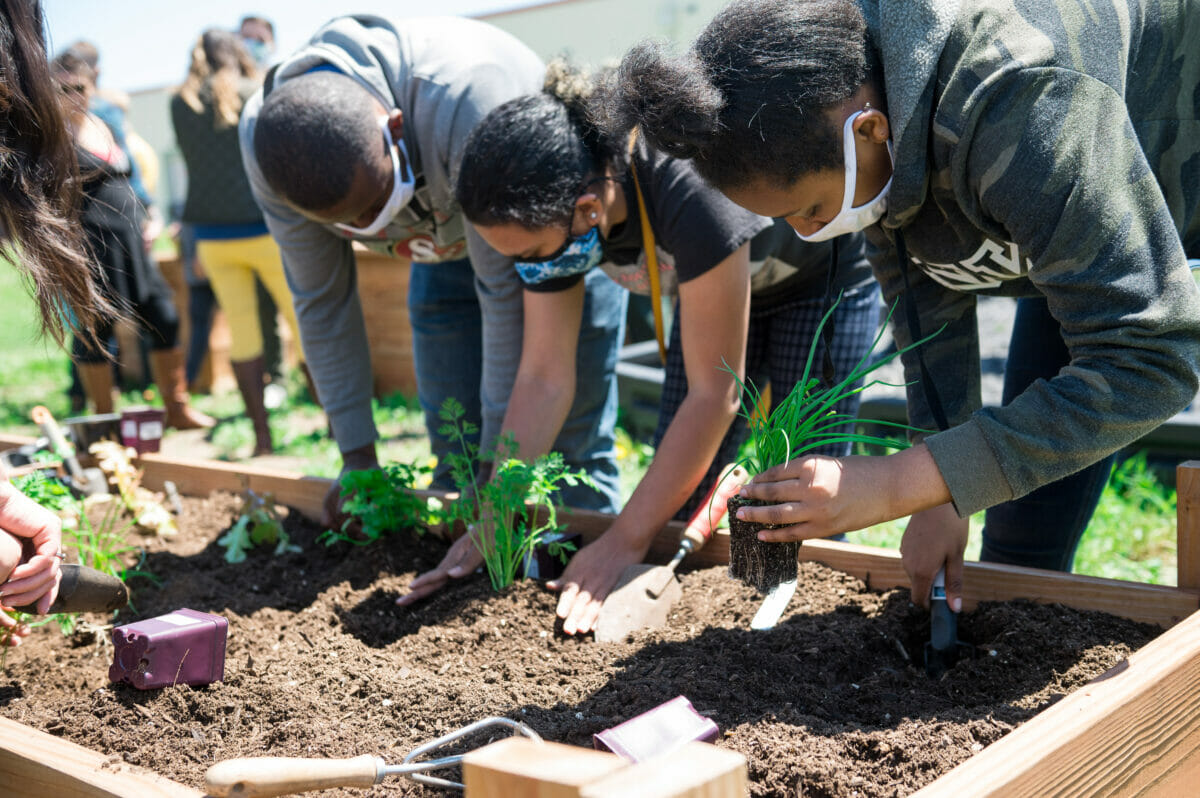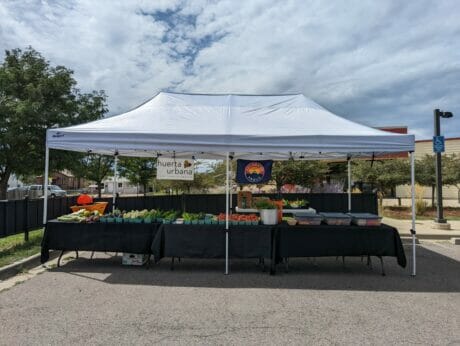Huerta Urbana’s community members learn about urban farming, while supplying their neighbors with fresh produce and gaining careers in the agriculture industry.

Denver’s Globeville and Elyria-Swansea neighborhoods have been designated food deserts, barren of grocery stores and affordable produce, for decades (a grocery store has been approved for the area, but has yet to open). In 2017, a co-op opened just outside of Globeville, but the organic, all-natural products remained too pricey for many community members. This was a community-wide problem, with many searching for a community-led solution. Enter: Huerta Urbana.
Launched in 2021, the 1.2-acre urban farm in downtown Denver, CO cultivates everything from basil to black-eyed peas, ensuring that community members have access to crucial food. Run by Focus Points Family Resource Center, Huerta Urbana is more than just a farmer’s market. It’s an agricultural education and entrepreneurship program, offering classes and opportunities for folks who want to work in the food space.
Participants receive training to manage a farm, pursue a career in something like environmental ag or even open their own farming business. “All participants earn while they learn,” says Matthew Vernon, chief of program operation. “Any time spent with the program is paid because the cost of childcare, transportation, rent and utilities add up. Even if you’re in a free program, you’re not making money to cover the bills at home.”

The farmer’s market is just one part of Huerta Urbana.
For Deisy Bustillos, Huerta Urbana offered an opportunity she, her mother Soledad and her sister Karen had been dreaming of since coming to Denver from Chihuahua, Mexico. Growing up, Bustillos and her sister felt the passion their mother had for gardening and fresh-cut flowers. They even had a hobby business buying flowers, creating arrangements and selling them on the side of the road for Valentine’s Day and Mother’s Day. But they didn’t have space to plant their own flowers in Denver and grow their project into a full-time business.
Serendipity struck in 2020. Bustillos’ mother helped with the community garden at Focus Points, and when they piloted the Huerta Urbana program, the three jumped on board.
Bustillos took every class offered, learning how to start a farm, cultivate different plants, take care of crops, harvest and then sell them. Now almost three years later, the ladies run S & D Creations. “We grow our own flowers, create arrangements and sell them at the farmers market. We also make jewelry and other crafts with dried flowers,” says Bustillos. “The program helped us tremendously with education about urban farming and providing seven raised beds for our flower farm.”
In addition to the education component, business funding and hands-on training Huerta Urbana provides, they also offer Veggie Valet, their version of a CSA. “It’s not just [our] produce—we purchase eggs, meat, meat alternatives, flour, masa, honey and beans from East Denver Food Hub (a social enterprise that supports small farms on the eastern plains); we also partner with two neighborhood bakeries impacted by the I-70 construction. It’s a way to support the vendors while providing fresh Colorado products to our customers,” says Vernon.
With little access to healthy food and produce, the community embraced Huerta Urbana, now an easy neighborhood walk away. “Foot traffic increased by 400 percent, pounds of produce distributed went up by 500 percent,” says Vernon. “That’s thousands of pounds of produce going out to hundreds of families on a weekly basis. We operate on a pay-what-you-can model and we’re the only farmers market in the Denver Metro region that accepts SNAP and WIC.”
Although produce represents the bulk of offerings, Huerta Urbana also has tables for businesses such as Compost Colorado, so folks have access to compostable hygienic products such as toothbrushes, laundry detergent and storage bags. Family Support Services register people for SNAP, WIC, utility systems and rental assistance. Dumb Friends League distributes gently used leashes, collars, toys and information on its next free spay and neuter clinic. The goal is to offer essentials in a single stop, without the shame or embarrassment that can sometimes come from need-based programs.
For Vernon, who has some personal history with not having what you need, eliminating shame was an important consideration. “There’s a sense of dignity that doesn’t always show up in resource offerings for families—you get in this line because you’re gonna use the token instead of regular money, and now everybody knows. We provide families with “market bucks” so everyone feels like they’re using the same currency.” This model allows customers to participate fully, and Focus Points reimburses vendors for any difference between what they collect and the market rate for their products.
Any given Friday wandering around Huerta Urbana, you can hear three or four different languages being spoken as produce flies everywhere. Children gather for storytime with Denver Public library, the smell of fresh tamales and tacos fills the air and performance artists from Project Athena (a Colorado nonprofit that empowers women through art) sing, dance and paint. There are poetry readings and face painters. Although Vernon says Huerta started to address the inequities of food access during the pandemic, the space has evolved into a social hub. More than an urban farm, it’s a cultural exchange that strengthens the surrounding communities.
“[Living in] this neighborhood, being walking distance to Huerta, I see how much it has helped the community,” says Bustillos. “Neighbors don’t really know each other today, but Huerta is a place where we can socialize, meet each other’s families and support [one another].”
Sounds great, needs to happen more places. Only concern would be re people stealing the produce.